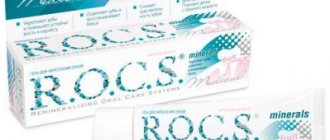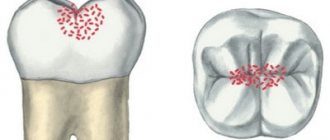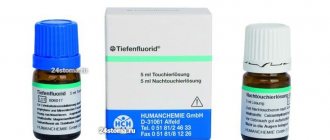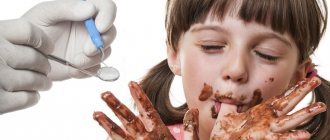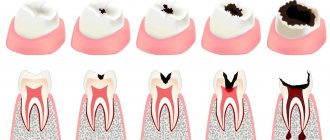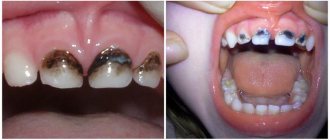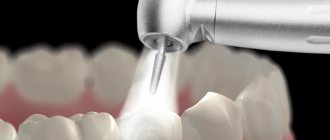Prevention of caries in children is an important point in maintaining the health of a still fragile body. Proper nutrition and care of temporary and permanent teeth are the main components of the correct approach to solving this problem.
Why is caries prevention needed in children if temporary teeth will soon be replaced by permanent ones? As practice shows, a set of timely preventive measures reduces the risk of infection of permanent teeth in children and adolescents by 80%!
What is caries in children?
Tooth decay in infants under one year of age is the destruction of mineralized tooth particles caused by the action of acids on the tooth surface produced by plaque bacteria.
An important element of this process is the imbalance between mineralization, which is the calcification of the tooth, and demineralization, literally the loss of tooth structure. Factors and causes involved in the formation of dental caries in young children include:
- bacteria present in dental plaque
- carbohydrates, that is, sugars present in food,
- predisposition of dental tissues to decalcification due to insufficient mineralization,
- composition of saliva, its quantity and ability to deoxidize the contents of the oral cavity
- time of exposure of the above factors to dental tissue.
The process of tooth decay in young children begins with the erosion of tooth enamel. This is a white cavity that does not yet require dental care and may disappear with calcium and fluoride supplements. If adequate caries prevention is not applied at this stage, the deeper tissues of the tooth are affected. Caries in young children can occur on the first tooth that emerges.
Can a filling be placed on a baby tooth?
If the doctor diagnoses not the first stage of tooth decay and insists that it is necessary to put a filling, it is better to agree with him. This is the fastest and most reliable way to solve the problem of infection and protect permanent teeth.
Modern filling materials are as safe as possible for children’s teeth. Depending on the stage of caries, the doctor will select a suitable filling option. Before installing a permanent filling, the dentist may place a temporary filling for several days to fix the medication inside the diseased tooth.
If the damage is not yet serious, the doctor will limit himself to preventive measures. There are different approaches and tools for different problems.
Why is it important to prevent the development of the disease?
In 90% of cases, caries of primary teeth occurs in an acute and painful form. Children cannot tolerate toothache, which often occurs with caries and can occur at any time of the day. This is the first reason to take care of effective early prevention. There are others:
- damage to the buds of permanent teeth exposed to milk;
- malocclusions that require orthodontic treatment to correct; speech disorders;
- chronic inflammation of the gums, stomatitis;
- Otitis media, tonsillitis, sinusitis due to bacterial damage.
Symptoms of caries
We are increasingly faced with the problem that parents seek help late, when the caries is already deep enough and more complex treatment is required. Why is this happening? Yes, simply because parents do not know what caries can look like. Parents need to remember that there is no need to look for dark-colored caries in children; caries is colorless by nature. You should be alerted to any change in the color of the enamel, both in the dark and in the light direction. The main symptom is a violation of the integrity of the enamel.
You can determine the presence of the disease without going to the dentist. Monitor your baby’s condition and make an appointment with a doctor if you notice the following prerequisites for caries:
- stains on enamel;
- bad breath, even with regular brushing;
- there are complaints of toothache that appears when chewing (the child may also refuse to eat without explaining the reasons).
Prevention of caries in children
How to avoid caries in a child? There are simple steps you can take to reduce the likelihood of it occurring.
- Brush your child's teeth as soon as their first teeth appear. At first, you can use sanitary napkins with xylitol.
- Don't lick your baby's pacifiers or let your baby eat from a spoon. This can transfer bacteria from the mouth to the baby and increase the likelihood of tooth decay on newly erupted teeth.
- Avoid giving your baby juices or sugary formulas at night or at bedtime. After your last meal, you need to brush your teeth! If your baby is breastfed, after a year, reduce nighttime feedings; remember that breast milk is also sweet and can cause the development of caries.
- From 1-1.5 years old, regularly visits the pediatric dentist (once every 3-4 months).
- Don't forget about regular oral hygiene at least twice a day for 2-3 minutes.
- Brush your child's teeth yourself until he is 4-5 years old, so be sure to help him with brushing. Until the age of 8-9 years, a child still cannot brush all his teeth correctly, even if he knows how to do it correctly.
- Let your baby's diet be rich in micronutrients. Encourage your child to chew carrots and apples to reduce plaque buildup and strengthen gums.
- Professional oral hygiene is not a luxury, but an extremely useful procedure, because only a dentist can remove hard plaque. Also, if possible, go through the procedures of enamel mineralization and fissure sealing on young permanent teeth with your child. These measures are a good prevention of dental caries in children.
School dentist
In this case, the work of a pediatric school dentist is very important. It is the school pediatric dentist who must competently convey to parents and children how important preventive dental examinations and timely treatment of caries are. In principle, schools currently provide entire treatment and preventive programs. Participation in them is not strictly obligatory and the decision to participate in these programs, of course, is made by parents. If you decide to refuse the services of a school dentist, we advise you to definitely find a good pediatric dentist, since in any case, healthy teeth are the result of the right approach to treatment and preventive monitoring of their health.
Deep fluoridation
Fluoride is known to be an important element in maintaining dental health. However, until recently, the only way to replenish this element in the enamel was toothpaste with fluoride. But its effectiveness is very low, and teeth are still susceptible to destruction. The lack of fluoride is especially felt by residents of those regions where there is a lack of it in drinking water and food.
Today, medicine offers a unique method for restoring tooth enamel and hard tooth tissues - deep fluoridation. This procedure replenishes mineral deficiencies, reduces tooth sensitivity and prevents the growth of bacteria that leads to tooth decay. For children, deep fluoridation is of particular importance, since the formation of permanent teeth occurs only in the child’s body. Insufficient intake of fluoride from food and irregular oral care can contribute to the premature destruction of tooth enamel. Using the deep fluoridation procedure, you can increase its hardness by 10 times!
What is the deep fluoridation method?
This method is based on a series of chemical reactions: they produce microcrystals of calcium fluoride that fill microcracks in the enamel. The deep fluoridation procedure itself takes place in several successive stages. First, the dentist brushes your teeth with a special paste to remove plaque and tartar. Then, using a jet of air, the teeth are dried and covered with a filling liquid, which “seals” the enamel (highly dispersed calcium fluoride and magnesium fluoride). After this, drying is carried out again and calcium and copper hydroxide are applied. A chemical reaction occurs between the first and second layers, during which microparticles of calcium fluoride are released, which very easily penetrate into the deep layers of enamel. At the same time, copper compounds formed as a result of the reaction have a strong bactericidal effect. Due to the described interaction of elements, anti-caries protection occurs.
When is deep fluoridation recommended?
This procedure is preventative and completely painless. It is aimed at long-term protection against enamel destruction and caries (the effect lasts up to two years). Therefore, it can be recommended to everyone who cares about dental health.
Deep fluoridation is especially useful in the following cases:
- to protect baby teeth in young children
- for teenagers whose bodies undergo changes associated with puberty, during which caries activity increases
- with fluoride deficiency due to poor diet or natural environment
- with increased tooth sensitivity
- with thinning enamel
- before installation and after removing braces
Due to the fact that the effect of deep fluoridation is quite long-lasting, it is enough to undergo the procedure 1-2 times a year. However, despite the obvious benefits of this preventive measure, we should not forget about other ways to take care of dental health: a balanced diet, regular brushing, regular visits to the dentist, and so on.
Other methods for preventing childhood caries
- Remineralizing therapy - restoration of the mineral composition of the enamel, restoration of its original strength and additional strengthening. The essence of the technique is reusable treatment of the tooth surface with a special gel or paste. Remineralizing compounds are characterized by a high concentration of phosphorus, calcium and other components beneficial to dental health that improve the structure of the enamel of primary teeth. Remineralization is carried out in a dental clinic, then dental treatment is carried out at home according to prescriptions recommended by the doctor.
- Silver plating is an outdated technique, but is still popular in many Moscow clinics. Lack of treatment - darkening of teeth, loss of aesthetics. The essence of the method is to coat the enamel with a 30% solution of silver nitrate, which ensures the destruction of bacterial microflora and stops the destruction of the tooth crown.
- Ozone therapy is a non-contact treatment for young children based on the antibacterial effect of ozone. Gentle tooth disinfection at an early stage stops the formation of a carious cavity with subsequent restoration of the enamel with remineralizing compounds.
- ICON technology is a modern method of caries treatment without a drill. The idea is to treat the problem area with a special gel that penetrates deeply into the tooth tissue, destroys bacteria and seals the enamel.
- ART method: painless and gentle manual cleaning of a carious cavity with subsequent installation of a filling.
Pediatric orthodontics
Another feature of the formation of the dentition during this period is the occurrence of various pathologies associated with dentofacial deformities. However, the elimination of any pathologies during this period seems to be the most efficient. The only disadvantage may be the need to wear special corrective devices that promote the formation of a normal bite and prevent the curvature of the dentition. And it’s not just about the aesthetic effect while wearing these devices, it’s about the difficulty of cleaning your teeth. It is during this period that special attention should be paid to regular, thorough oral hygiene. Observation in this case by a good qualified orthodontist is of particular importance. So, proper timely sanitation of the oral cavity, identifying the development of caries at the earliest stages, carrying out procedures to strengthen teeth with the help of special dental preparations and procedures - all this helps prevent caries in school-age children at the earliest stages.
Diet for the prevention of caries in children
Caries bacteria feed on sugar: glucose, fructose or sucrose. Sweets are the main ally of this disease. Although children love them, they should not overuse them. Sugar in desserts not only contributes to the development of tooth decay. It also includes refined carbohydrates such as white sugar, flour and processed foods. The following methods should be followed: dental caries in children
- Eliminate sugar from your diet.
- Replacing colored drinks with water.
- Avoid processed foods.
- Refusal of products containing preservatives.
It often happens that the child drinks colored and carbonated drinks, eats cookies, chips, lollipops or candies as a snack, and drinks milk or cocoa before bed. All of these everyday activities can lead to tooth decay in young children. To prevent serious illness, which is unfortunately not getting enough attention, you need to choose healthier alternatives to popular snacks, sweets and drinks.
The correct level of minerals and nutrients, the dose of vitamins, the rational dosage of sugars and the solid consistency of food are factors that can effectively prevent the formation and development of dental caries in young children. Doctors are confident that every child will be grateful to their parents for developing good habits, proper oral hygiene and diet, which affects the life and health of children not only now, but also in the future.
To prevent caries treatment in young children, it is worth conducting a preventive dental examination every 6 months and removing tartar. Children should be constantly encouraged to prevent tooth decay because it is easier to prevent than to cure, especially when it hurts, and visits to the dentist are frequent and unpleasant for the child.
Endogenous prevention
This method is aimed at improving the condition of teeth from the inside. Prevention involves adjusting the nutritional system and taking additional mineral complexes (fluoride-containing preparations; vitamins A, D, C, B1, B6, etc.). Parents should exclude sweets and soda from their child’s diet or reduce their consumption as much as possible. Solid fruits and vegetables are a good substitute and are excellent for cleaning the mouth. Consumption of dairy products rich in calcium is also an excellent prevention of caries.
How to choose toothpaste for a child
Since young children often swallow toothpaste, and sometimes even eat it secretly from their parents, the composition of the toothpaste must be extremely safe for health. Unlike adults, infants do not need large amounts of fluoride, so a child's first toothpaste should not contain fluoride. You should be aware that excessive consumption of fluoride, especially if it is constantly ingested, can lead to damage to tooth enamel and the development of fluorosis.
For preschool children, you can purchase toothpastes with a minimal fluoride content, but in fact, toothpastes with fluoride are recommended only for adults whose teeth have already been fully formed.

